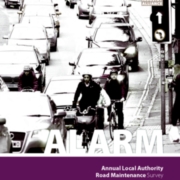Local road investment still falling short
This year’s Annual Local Authority Road Maintenance (ALARM) survey reports that the overall highways maintenance budgets for local councils has increased for the second successive year. Though there are some early signs that this is stemming further decline in local road conditions, the journey from slowing decline to improving the overall condition of the network is a long one. Rick Green, Chairman of the Asphalt Industry Alliance, provides a summary of the Report’s findings.
Each year the Asphalt Industry Alliance (AIA) commissions an independent survey of local authority highway departments in England and Wales. Widely respected throughout the highways industry, the ALARM survey seeks to give a voice to the views of those responsible for maintaining the vast majority of the road network, and is considered the most authoritative and comprehensive study into the condition and funding of local road maintenance.
Highways maintenance budgets
The 2019 ALARM survey – the 24th annual report – highlights that, overall, local authorities have seen their highway maintenance budgets increase for the second successive year to £4.1 billion (2017/18: £3.46 billion). Figures from a decade ago reported this annual figure as £3.1 billion, highlighting that, after some years of below-inflationary rises, budgets are now rising more in line with inflation.
In England (excluding London) the reported average local authority budget for highway maintenance in 2018/19 increased by 20% to £31.5 million (2017/18: £26.2m), 55% of which is funded by central government. This is in contrast to Welsh local authorities reporting a slight decrease (4%) to £7.8 million in 2018/19 (2017:18: £8.1).
It is important to stress that the average totals hide a wide disparity between those seeing increased highway maintenance funding and those local authorities who have experienced a cut, with funds diverted to other areas of council expenditure, notably education and social care. In England more than a quarter of local authorities reported a cut in last year’s budgets, while in Wales and in London around a half of authorities reported a year-on-year reduction. This disparity is particularly apparent when considering highway maintenance budgets per mile of local road, which varies from less than £9,000 per mile to more than £90,000 per mile.
Consequently, the focus on primary routes continues and achieving target conditions on all categories of road still remains out of reach. To put this into context, if local authorities had enough funds to meet their own targets across all road types it would give us more than 20,000 miles of improved local roads.
Carriageway maintenance
The shortfall in annual carriageway maintenance budget reported this year is £657 million, the equivalent of an average funding gap of £3.9 million per authority. In England the shortfall has widened by 21%. from £3.4 million per authority last year to £4.1 million this, while in London the figure has increased by a third from £3.0 million 2017/18 to £4.0 million in 2018/19. In Wales, the average shortfall reported declined by 11% from £3.1 million last year to £2.8 million this. The real extent of the shortfall could be being masked by the fact that 40% of English and Welsh authorities report transferring capital funds, intended for highways improvements, to supplement traditional revenue budgets for maintenance work.
Potholes
After four years of decline, the total number of potholes filled in the last year jumped by 24%, from 1.5 million in 2018, to more than 1.86 million this year, the equivalent of one pothole being repaired every 17 seconds in England and Wales. The biggest increase was reported by London authorities, with the average number of potholes filled climbing from 1,878 per authority in 2017/18 to 2,711 in 2018/19 – a 44% increase year-on-year.
The number of potholes filled by Welsh councils, which did not benefit from the additional funding allocated by DfT during the year, fell by more than half on the previous year’s figures from an average of 5,976 per authority reported in ALARM 2018 to 2,531.
Qualitative feedback reported that intense rainfall last winter, followed by a hot, dry summer, contributed to the number of potholes formed across the network.
Budget shortfall
The ALARM survey asked highway departments to estimate how much it would cost to bring their road networks up to scratch (assuming they had the resources in place to make it practical to do so as a one-off project). The estimate for this one-time “catch-up” cost has grown by approximately 5% to £9.79 billion from £9.31 billion reported last year. This is an average of £69.9 million per authority in England; £31.9 million in London and £36.3 million in Wales. Highway departments reported that it would now take 10 years to get local roads back into a reasonable steady state, if adequate funding and resources were in place.
Long-term investment
Last year we called for an additional £1.5 billion of funding for local roads each year for the next 10 years to allow them to be brought up to a condition from which they can be managed in a cost-effective way. We stand by this call. The findings from this year’s ALARM survey support the need for this long-term approach We know it’s a long journey from slowing decline to improving the overall condition and resilience of the network – which we all rely on every day – and the additional investment could go to waste if it is not continued. Sustained investment over a longer timeframe is needed if we want a local road network that supports enhanced mobility, connectivity and productivity.
You can download the full survey here: http://www.asphaltuk.org/alarm-survey-page/


.png)



.png)